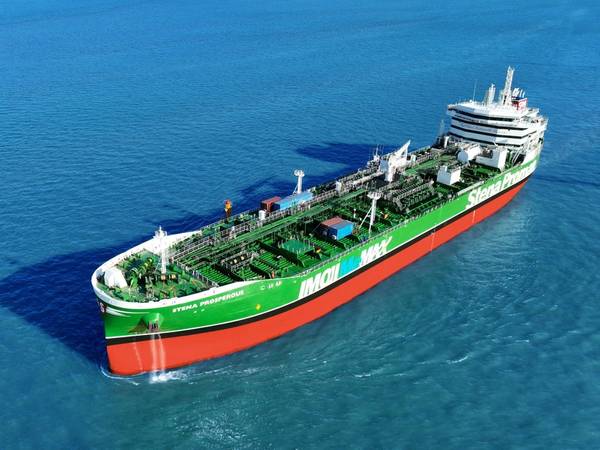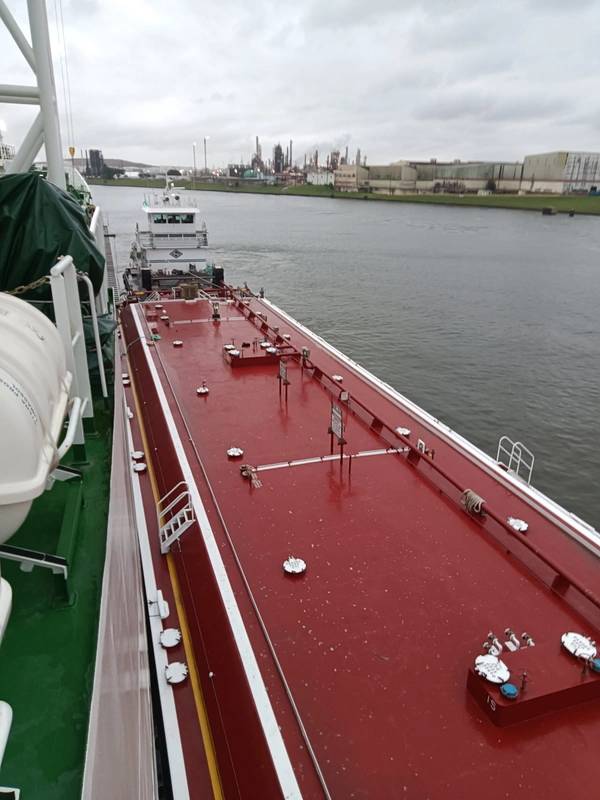
Proman Stena Bulk, the joint venture between tanker company Stena Bulk and methanol producer Proman, announced the successful completion of the first ever barge-to-ship methanol bunkering on the U.S. Gulf Coast.
The JV tankers Stena Pro Marine and Stena Prosperous were refueled with methanol via barge while discharging clean petroleum products at a terminal in the Port of Houston in the first week of April.
Stena Pro Marine was bunkered with 1,408MT of methanol, and Stena Prosperous was refueled with 1,203MT during the operation. Both ships were time-chartered to a global trading house at the time of the refueling.
The barge bunkering operation was conducted jointly with Kirby Corporation, the largest tanker barge provider in the United States.
Anita Gajadhar, Executive Director, Marketing, Logistics and Shipping, Proman, said, “Completing the first barge-to-ship methanol bunkering on the U.S. Gulf Coast is a tremendous achievement for the Proman Stena Bulk joint venture. The Port of Houston is a major global cargo hub with significant latent methanol storage capacity. These qualities made it a natural testbed for our first US ship-to-ship bunkering.
“Proman Stena Bulk continues to work with partners across the supply chain to develop methanol bunkering facilities worldwide and at key strategic bunker hubs. Announcements like today’s continue to prove the viability of the methanol marine fuel supply chain.”
“Kirby was pleased to be the service provider for this job,” said Kirby Marine Group President Christian O’Neil. “It was a natural for us: we have extensive expertise with methanol as a cargo, with conventional bunkering, and with barge-to-ship lightering of all manner of products. We are committed to remaining a leader in energy transportation, regardless of the form that energy takes. We look forward to doing this again and again in Houston and beyond.”
Methanol is widely available in the Port of Houston, which is the United States’ busiest port in terms of foreign tonnage. Thanks to the presence of major petrochemicals hubs and significant storage capacity, more than 275,000MT of methanol is available at the port.
The landmark first bunkering supports wider efforts by U.S. ports and shipping companies to make the industry more sustainable. The Port of Houston aims to become carbon neutral in the next 30 years. A key pillar of the port’s strategy is the deployment of alternative fuels and clean energy sources.
The bunkering also supports U.S. commitments to cut methane emissions by 30% by 2030 under the Global Methane Pledge, which was announced at the COP26 climate summit in 2021. Methanol as a marine fuel clearly supports the ambitions of the pledge to cut back on methane emissions across the energy value chain in the near term.
Currently available conventional methanol, produced from natural gas, virtually eliminates SOx and particulate matter, cuts NOx by 80%, and reduces tank-to-wake CO2 emissions from the vessel’s commercial operations by up to 15% compared to conventional marine fuels. By using methanol, the joint venture vessels are futureproofed against every incoming emissions target, as greater quantities of low-carbon and green methanol become available for blending and bunkering in the near future.
Production of green methanol from sustainable sources such as sustainable bio-mass or renewable energy is growing and highly scalable. Proman is investing in its own low-carbon and green methanol production capabilities, including a new 100,000 tonne per year methanol facility in development in North America. The project is currently being constructed with a target start of operations in 2025. The facility will produce bio-methanol from non-recyclable forestry residues and municipal solid waste and will substantially contribute to the circular economy.
The news of this first U.S. Gulf methanol barge-to-ship bunkering comes ahead of the naming ceremony for Stena Promise in the Port of Rotterdam. Rotterdam was the site of Proman Stena Bulk’s first barge-to-ship methanol bunkering, in August 2022, when Stena Pro Patria took on the fuel during a regularly scheduled port call.
 Stena Prosperous methanol bunkering in Houston. (Photo: Proman Stena Bulk)
Stena Prosperous methanol bunkering in Houston. (Photo: Proman Stena Bulk)




